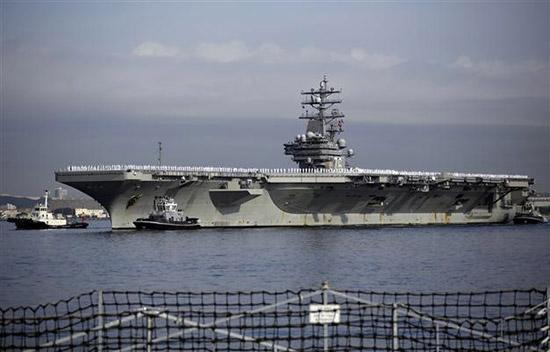China navy calls for United States to reduce risk of misunderstandings
BEIJING - Reuters

U.S. navy nuclear-powered aircraft carrier USS Ronald Reagan arrives at the U.S. Navy's Yokosuka base in Yokosuka, near Tokyo Thursday, Oct. 1, 2015. AP Photo
China hopes the United States can scale back activities that run the risk of misunderstandings, and respect China's core interests, the Defence Ministry on Oct.1 cited a senior Chinese naval commander as saying.Each country has blamed the other for dangerous moves over several recent incidents of aircraft and ships from China and the United States facing off in the air and waters around the Asian giant.
Last year the Pentagon said a Chinese warplane flew as close as 20 to 30 feet (7 to 10 m) from a U.S. Navy patrol jet and did a barrel roll over the plane.
The Pacific is an important platform for cooperation, Admiral Sun Jianguo, deputy chief of staff of the People's Liberation Army, told Admiral Harry Harris, commander of the U.S. Pacific Command.
"The prerequisite for win-win cooperation is mutual trust," Sun said, according to China's Defence Ministry.
"(We) hope the U.S. side can pay great attention to China's concerns, earnestly respect our core interests, avoid words and actions that harm bilateral ties, and reduce activities which cause misunderstandings or misjudgements," he added.
The two officials were meeting in Hawaii on the sidelines of a gathering of Asia-Pacific defence officials.
The comments came as one of the U.S. Navy's most advanced aircraft carriers docked in Japan at the start of a deployment that will strengthen the capability of the Seventh Fleet in Asia and boost ties between the United States and its closest regional ally.
Last week, the United States announced pacts with China on a military hotline and rules governing airborne encounters, which seek to lessen the chance of an accidental flare-up between the two militaries, despite tension in the South China Sea.
China last month said it was "extremely concerned" about a suggestion by a top U.S. commander that U.S. ships and aircraft should challenge China's claims in the South China Sea by patrolling close to artificial islands it has built.
Beijing claims most of the South China Sea, through which $5 trillion in ship-borne trade passes every year.
















